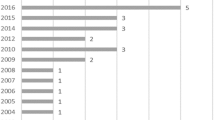Abstract
Our intelligent decision-making approach (IDMA) is an instance of cognitive computing. It applies causality as common sense reasoning and fuzzy logic as a representation for qualitative knowledge. Our IDMA collects raw knowledge of humans through psychological models to tailor a knowledge-base (KB). The KB manages different repositories (e.g., cognitive maps (CM) and an ontology) to depict the object of study. The IDMA traces fuzzy-causal inferences to simulate causal behavior and estimate causal outcomes for decision-making. In order to test our approach, it is linked to the sequencing module of an intelligent and adaptive web-based educational system (IAWBES). It is used to provide student-centered education and enhance the students’ learning by intelligent and adaptive functionalities. The results reveal users of an experimental group reached 17% of better learning than their peers of the control group.
Access this chapter
Tax calculation will be finalised at checkout
Purchases are for personal use only
Preview
Unable to display preview. Download preview PDF.
Similar content being viewed by others
References
Modha, D.S., Ananthanarayanan, R., Esser, S.K., Ndirango, E., Sherbondy, A.J., Singh, R.: Cognitive Computing. Cognitive Computing Communications of the ACM 54(8), 62–71 (2011)
Anshakov, O.M., Gergely, T.: Cognitive Reasoning: A Formal Approach. Springer, Heidelberg (2010)
Pearl, J.: Causality: Models, Reasoning, and Inference. Cambridge University Press, Cambridge (2000)
Panton, K., Matuszek, C., Lenat, D., Schneider, D., Witbrock, M., Siegel, N., Shepard, B.: Common Sense Reasoning – From Cyc to Intelligent Assistant. In: Cai, Y., Abascal, J. (eds.) Ambient Intelligence in Everyday Life. LNCS (LNAI), vol. 3864, pp. 1–31. Springer, Heidelberg (2006)
Muller, E.T.: Common Sense Reasoning. Morgan Kaufman Publishers, California (2006)
Bartolomei, J.E.: Qualitative Knowledge Construction for Engineering Systems: Extending the Design Structure Matrix Methodology in Scope and Procedure. PhD thesis, Massachusetts Institute of Technology (2007)
Wallach, W., Franklin, S., Allen, C.: A Conceptual and Computational Model of Moral Decision Making in Human and Artificial Agents. In: Wallach, W., Franklin, S. (eds.) Topics in Cognitive Science, special issue on Cognitive Based Theories of Moral Decision Making, pp. 454–485. Cognitive Science Society (2010)
Senglaub, M., Harris, D., Raybourn, E.M.: Foundations for Reasoning in Cognition-Based Computational Representations of Human Decision Making. Technical report, Sandia National Laboratories (2001)
Ramachandran, D.: Using Common Sense for Decision Making in an Adventure Game. AAAI Spring Symposium Series. AAAI, California (2007)
Osman, M., Shanks, D.R.: Individual Differences in Causal Learning and Decision Making. Acta Psychologica 120, 93–112 (2005)
Premchaiswadi, W., Jongsawat, N., Romsaiyud, W.: Bayesian Network Inference with Qualitative Expert knowledge for Group Decision Making. In: 5th IEEE International Conference on Intelligent Systems (IS), pp. 126–131. IEEE Press, New York (2010)
Al Shayji, S., El Zant, N.: Building Fuzzy-Logic Ontology for Political Decision-Makers. Int. J. Mathematical Models and Methods in Applied Sciences 5(5), 991–1001 (2011)
Dubois, D., Prade, H.: Fuzzy Relation Equations and Causal Reasoning. Fuzzy Sets and Systems 75(2), 119–134 (1995)
Tsadiras, A.K., Kouskouvelis, I.: Using Fuzzy Cognitive Maps as a Decision Support System for Political Decisions: The Case of Turkey’s Integration into the European Union. In: Bozanis, P., Houstis, E.N. (eds.) PCI 2005. LNCS, vol. 3746, pp. 371–381. Springer, Heidelberg (2005)
Sobecki, J., Fijałkowski, D.: Student Automatic Courses Scheduling. In: Nguyen, N.T., Trawiński, B., Jung, J.J. (eds.) New Challenges for Intelligent Information and Database Systems. SCI, vol. 351, pp. 219–226. Springer, Heidelberg (2011)
Wooldridge, M.: The Logical Modeling of Computational Multi-agent Systems. PhD thesis, Manchester Metropolitan University (1992)
FIPA-ACL: Agent Communication Language. Technical specifications, Foundation for Intelligent Physical Agents (2000)
Canales, A., Peña Ayala, A., Perdo, R., Sossa, H., Gutierrez, A.: Adaptive and Intelligent Web based Education System: Towards an Integral Architecture and Framework. Expert Systems with Applications 33(4), 1076–1089 (2007)
Peña Ayala, A.: Student Model based on Psychological Models. In: Uzunboylu, H. (ed.) WCES. Procedia-Social and Behavioral Sciences, vol. 1(1), pp. 1996–2000. Elsevier, UK (2009)
Peña Ayala, A., Sossa, H.: Semantic Representation and Management of Student Models: An Approach to Adapt Lecture Sequencing to Enhance Learning. In: Sidorov, G., Hernández Aguirre, A., Reyes García, C.A. (eds.) MICAI 2010, Part I. LNCS (LNAI), vol. 6437, pp. 175–186. Springer, Heidelberg (2010)
Peña Ayala, A.: Ontology Agents and their Applications in the Web-based Education Systems: Towards an Adaptive and Intelligent Service. In: Nguyen, N.T., Jain, L.C. (eds.) Intelligent Agents in the Evolution of Web and Applications. SCI, vol. 167, pp. 249–278. Springer, Heidelberg (2009)
Peña Ayala, A., Perdo, R., Sossa, H., Gutierrez, A.: Causal Knowledge and Reasoning by Cognitive Maps: Pursuing a Holistic Approach. Expert Systems with Applications 38(1), 2–18 (2008)
Author information
Authors and Affiliations
Editor information
Editors and Affiliations
Rights and permissions
Copyright information
© 2012 Springer-Verlag Berlin Heidelberg
About this paper
Cite this paper
Peña-Ayala, A., Mizoguchi, R. (2012). Intelligent Decision-Making Approach Based on Fuzzy-Causal Knowledge and Reasoning. In: Jiang, H., Ding, W., Ali, M., Wu, X. (eds) Advanced Research in Applied Artificial Intelligence. IEA/AIE 2012. Lecture Notes in Computer Science(), vol 7345. Springer, Berlin, Heidelberg. https://doi.org/10.1007/978-3-642-31087-4_55
Download citation
DOI: https://doi.org/10.1007/978-3-642-31087-4_55
Publisher Name: Springer, Berlin, Heidelberg
Print ISBN: 978-3-642-31086-7
Online ISBN: 978-3-642-31087-4
eBook Packages: Computer ScienceComputer Science (R0)




